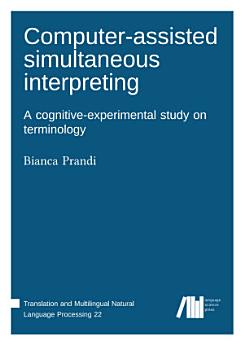Computer-assisted simultaneous interpreting: A cognitive-experimental study on terminology
About this ebook
Quantitative and qualitative data were collected during an eyetracking experiment at the Translation & Cognition Centre of the University of Mainz. The study followed a convergent mixed-method and multi-method approach and involved nine interpreting students. Prior to the experimental task, the informants were trained in the use of three terminology support tools: a digital glossary in PDF format, a CAI tool with manual look-up, and a mock-up CAI tool with integrated automatic speech recognition (ASR) for terminology. After several pre-tests, the participants interpreted three speeches from English into their native German using a different tool each time. To increase comparability between the three conditions and control for potentially confounding variables, the speeches were validated during a pilot study. The students’ gaze data and deliveries were recorded and analysed. Qualitative data on the informants’ perception of the tools were collected post-hoc. In the study, several performance, behavioural, and subjective measures were analysed: terminological accuracy and errors and omissions; glossary queries, ear-voice span, inter-cluster pause duration, time to first fixation, average fixation duration, and fixation time; qualitative questionnaire responses. The findings provide insights into the effects of CAI tools on CL and attention allocation in interpreter-CAI tool interaction during simultaneous interpreting.
As this is the first study on in-process CAI tool use with a markedly cognitive orientation, it entails significant implications for the methodological development of CAI research and the design of future studies on cognitive aspects of CASI, while raising additional questions in need of further investigation.
About the author
Bianca Prandi holds a bachelor’s and a master’s degree from the University of Bologna/Forlì. After completing her studies in interpreting, she pursued a PhD in translation studies at the Johannes Gutenberg University of Mainz/Germersheim. She is currently a postdoctoral researcher and lecturer in Interpreting Studies at the University of Innsbruck. Her research interests are translation and interpreting technologies, human-machine interaction in interpreting, and cognitive aspects of interpreting.







